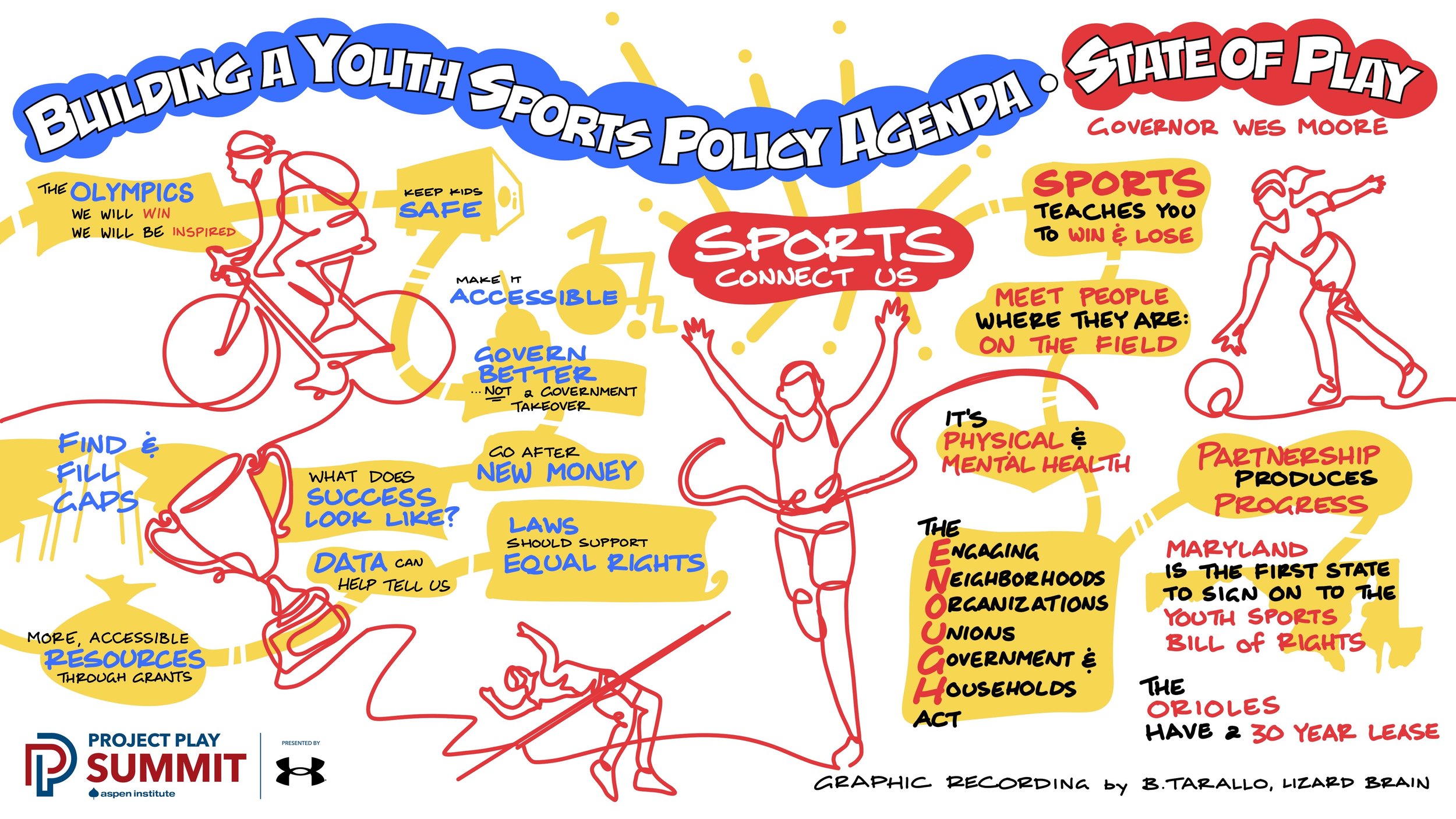(L-R) Cdr. Dr. Katrina Piercy, LeagueApps president Jeremy Goldberg, Tatyana McFadden PLY, and Dr. Ashleigh Huffman speak at Project Play Summit 2024, May 15 in Baltimore.
Photo: Howard Korn for the Aspen Institute
- Baltimore as Beacon with Kevin Plank
- Health Equity in Youth Sports, featuring Mike Locksley, Marci Goolsby & Mayrena Hernandez
- The Key to 63, featuring Christina Hixson, Kim Hegardt & Kevin Martinez
- Catch Her If You Can, featuring Diana Flores
- Service Learning Through Sports, featuring Josie Portell and Rishan Patel
- Building a Youth Sports Policy Agenda
- State of Play Session, featuring Maryland Gov. Wes Moore
Project Play is creating the nation’s first policy framework for youth sports and used a panel discussion at the Project Play Summit to explore the creation of a politically durable agenda to improve safety, access and governance.
Moderated by Dr. Ashleigh Huffman, a policy consultant for the Aspen Institute Sports and Society Program, the panel highlighted the work, present accomplishments and future goals of building a youth sports agenda. Huffman outlined the goals for a policy agenda:
Keep kids safe. Huffman noted the importance of oversight on young abuse, injury, and burnout that can come from sports. “In the words of (Under Armour CEO) Kevin Plank, ‘Protect This House,’” she said.
Make sports accessible: Address the need for affordable and reachable opportunities for kids to play sports.
Govern sports better: “How do we hold folks accountable?” Huffman asked. “You can have all of the policies in the world, but if no one is enforcing them, policies just fall on deaf ears.”
The goals around a youth sports policy agenda include ensuring children with disabilities have access. Panelist Tatyana McFadden, a 20-time Paralympic medalist, was once denied the right to compete on her high school’s track team. She sued her high school and won the opportunity to compete alongside nondisabled competitors. Almost 20 years after winning the case, McFadden reflected on how laws create equity for athletes.
“I was denied a uniform, the right to race alongside others, and use the same bus. … I was devastated as a 15-year-old,” McFadden said. “(But) laws are supposed to prevent discrimination, support equal access and acknowledge equal rights for people with disabilities.”
Creating policy also requires navigating politics. PLAY Sports Coalition founder Jeremy Goldberg discussed recent work on Capitol Hill this year, such as efforts to pass the PLAYS in Youth Sports Act. The bill calls on the Secretary of Health and Human Services to establish a $75 million annual grant program to support nonprofits working to improve health and positive youth development through sports participation. But Goldberg’s ambitions are even bigger.
“There’s no reason why we can’t figure out how, over the next number of years, to unlock $1 billion to be funded into this sector,” Goldberg said. “(We’re) borrowing from the playbook that the Aspen Institute surfaced (and) looking at where there’s new sources of revenue.”
Research by Goldberg included utilizing an Aspen Institute report with policymakers to explain why sports matter.
“The data and stories are so compelling, we were able to have a lot of success,” Goldberg said of lobbying efforts. “A lot of it is about making the case and connecting people to local voices, and if you can do that, it’s irresistible to understand the power of what sports can offer.”
Katrina Piercy, director of prevention science for the U.S. Department of Health & Human Services, said governmental oversight can benefit youth sports without being the “federal government takeover” some advocates and parents worry about. The federal government has set a goal to have 63% of children participating in sports by 2030. Piercy said there is middle ground between government and private ambition.
“The 63% by ‘30 is data from the Health Resources Service Administration – that’s our north star,” Piercy said of the goal for youth sports participation. “The role of the government is to have that birds-eye view and say, ‘Where is (participation) happening, and where is it not? Where are the disparities for youth sports participation?’”
Student journalists from the University of Maryland’s Shirley Povich Center for Sports Journalism covered the Project Play Summit on behalf of the Aspen Institute. More of their stories can be found here. For Project Play’s recap of the Summit, click here. For the full Summit agenda, including replays of every session, click here. The full “Building a Youth Sports Policy Agenda” panel is available here.


